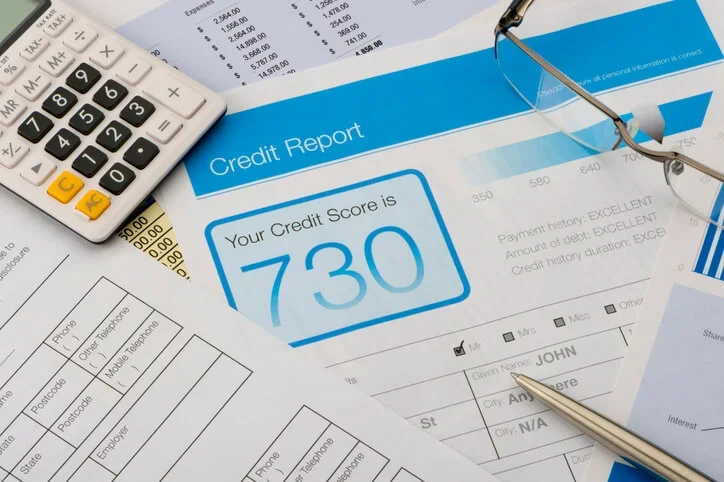BUSINESS ENERGY
How your business credit score affects your energy deals
Read time: 5 minutes
By Les Roberts, Business Energy Expert
29th July, 2025
When you’re running a small business, keeping costs under control is key. That includes your business energy bills. Energy costs can quickly become a major outgoing, especially if you're on a less competitive tariff. What many businesses don’t realise is that your business credit score can directly influence the energy deals you're able to get.
In this guide, we’ll explain what your business credit score is, how it affects your energy contract options, and what you can do to improve your chances of securing better business energy rates and terms from suppliers.

What is a business credit score?
A business credit score is a number that reflects how financially reliable your business is in the eyes of banks and creditors. It works much like a personal credit score but focuses on your business’s financial behaviour. This includes how regularly you pay invoices, how much debt you carry, and whether you’ve had any legal or financial issues in the past.
Credit reference agencies — such as Experian, Equifax, and Creditsafe — collect and analyse financial data about your company. They then assign a score, typically on a scale from 0 to 100. A higher score suggests a lower risk to potential lenders and energy suppliers, while a lower score may be a warning sign that your business could struggle to meet payment terms.
Your credit score doesn’t just influence business loan and finance applications. It can also affect how much you pay for business energy, what contracts you're offered, and even whether you're able to switch to a new supplier.
How does your business credit score affect energy deals?
When you apply for a business energy contract, the supplier will usually carry out a credit check to understand how risky it might be to supply your business. The results of this check help them decide whether to offer you a contract at all, what kind of tariffs you qualify for, and whether to apply additional conditions, like a security deposit or a prepayment meter.
A high business credit score
A strong credit rating usually works in your favour. It means you’re more likely to be offered competitive, fixed-rate deals, and you may be able to choose from a wider range of business energy tariffs. Suppliers are also more likely to offer flexible payment terms, such as monthly billing in arrears, and they usually won’t ask for a deposit.
A low business credit score
If your business credit score is low or poor, your options may be more limited. Some suppliers may offer you only higher-rate energy deals or ask you to pay in advance. You might also be required to pay a security deposit before your contract starts, and in some cases, you could be placed on a prepayment meter, which tends to be more expensive. In the most severe cases, a supplier might refuse a contract altogether, which is why it’s crucial to understand how to get a business energy contract with bad credit.
Why do energy suppliers carry out credit checks?
Credit checks help energy suppliers manage financial risk. Supplying business gas and electricity costs money up front, and if a business is late with payments or defaults entirely, the supplier absorbs the cost.
By checking your credit score, the supplier is trying to understand how likely it is that your business will pay its bills in full and on time. A low credit score doesn’t automatically mean your business is in trouble, but it can act as a red flag. It suggests there may have been issues in the past, or that the business is struggling to manage its financial obligations. As a result, suppliers may be more cautious or offer less favourable terms.
Can you get a business energy deal with bad credit?
Yes, you can get business energy for poor credit, but you may need to work a bit harder to find the right deal. You may be hit with higher prices, upfront deposits, or limited tariff choices. Some small business energy suppliers are more flexible, particularly if your credit score is improving.
You may be asked to pay a deposit before the contract starts. In some cases, the supplier might offer a prepayment plan, where you top up your meter in advance. You could also be offered a higher unit rate or standing charge compared to a business with good credit.
Some business energy suppliers are more flexible than others, especially those that work with businesses in financial recovery. If your business can demonstrate recent improvements, such as settled debts or consistent payments, you may be able to access better terms than you expect.
What’s the difference between a business and personal credit check?
Personal credit checks look at your individual financial history, including your credit card usage, personal loans, and mortgage repayments. Business credit checks, on the other hand, focus entirely on your business’s financial health. This includes your trading history, your ability to pay suppliers, any County Court Judgments (CCJs), and whether you file your company accounts on time.
If you’re a sole trader or run a small partnership, your personal credit score may be checked alongside your business file. For limited companies, suppliers typically focus on your business credit record.
Do business energy suppliers report to credit agencies?
Most suppliers don’t report everyday payment activity to credit reference agencies, so paying your energy bills on time won’t necessarily boost your score. However, if you miss payments, default on your contract, or have legal action taken against you, this information can appear on your credit report and damage your score.
In short, positive behaviour may go unrecorded, but negative behaviour is much more likely to be flagged.
What affects your business credit score?
Your business credit score is shaped by a mix of financial behaviours and legal records. Here are some of the things that can have an impact:
- Payment history - This is one of the most important factors. If your business regularly pays suppliers and lenders on time, this can improve your score. Late or missed payments can lower it.
- Outstanding debt - The total amount of outstanding debt your business carries also plays a part. High levels of debt can signal financial strain, which is viewed as risky by potential suppliers.
- Credit utilisation - Your credit utilisation rate is another factor — this refers to how much of your available credit you're using. If you regularly max out your credit facilities, it could hurt your score.
- Public records like CCJs or insolvency - Public records can also have a significant impact. Any County Court Judgments (CCJs), insolvency filings, or director disqualifications will be recorded and can reduce your creditworthiness.
- Business age and size - The age and size of your business also matter. Newer or smaller businesses tend to have lower credit scores simply because there is less data available.
- Filing habits with Companies House - Failing to file your company accounts or confirmation statements with Companies House on time can have a negative impact on your score.
- Avoid applying for multiple credit lines at once - Try to keep the number of credit applications to a minimum in any six-month period. Too many applications can make you look desperate for credit, which is a red flag for reference agencies.
How to check your business credit score
You can check your business credit score by contacting a commercial credit reference agency. Some of the main ones include Experian, Equifax, Creditsafe, and Graydon. These agencies offer different types of reports, ranging from free basic overviews to more detailed paid reports with financial analysis and alerts.
It’s a good idea to review your report regularly, especially if you’re thinking about switching energy suppliers or applying for new contracts. This will help you spot any inaccuracies and give you time to take corrective action if needed.
How to improve your business credit score
There are several steps you can take to improve your business credit score over time, including:
- Pay bills and suppliers on time - Paying on time is one of the most effective ways to build a positive credit history. It shows that your business is financially responsible and reliable.
- File accounts promptly - It’s also important to keep your company records up to date. Make sure you file annual accounts and confirmation statements with Companies House on time each year.
- Reduce outstanding debts - If your business has outstanding debts, try to reduce them wherever possible. Paying down balances and lowering your credit utilisation rate can both help improve your score.
- Monitor your credit report for errors - You should also check your credit report for any mistakes. Inaccurate or outdated information can harm your score unnecessarily. If you find anything that looks wrong, raise a dispute with the relevant agency.
- Open small trade credit accounts - If you're just starting out, opening trade accounts with small balances that you can easily pay off in full is a good way to build your credit score.
If your business is new and has little credit history, you may want to start small by opening trade credit accounts with suppliers that report payments to credit agencies. Over time, this will help build a more complete financial profile.
What to do if you're refused a business energy deal
If you’re turned down for a business electricity or gas contract, there are still options available. One approach is to try a different supplier. Credit requirements vary, and another provider may be willing to offer you a contract.
You could also consider working with a business energy broker. They can help match your business with suppliers that are more flexible when it comes to credit. If your credit score is the main issue, take some time to improve it before reapplying.
Another option is to look into a prepayment meter. While this isn’t right for every business, it can give you more control over your energy costs and help avoid future debt.
Will switching business energy suppliers affect your credit score?
Switching your business energy supplier won’t affect your credit score directly. Most suppliers carry out a soft credit check as part of the application process. This is visible to you but doesn’t influence your credit rating.
However, if you fall behind on payments or default on your new contract, that could damage your credit file. That’s why it’s important to make sure your energy bills remain a financial priority after switching.
Tips for getting the best business energy deal
To get the best possible deal, it’s important to compare rates from different business energy suppliers. Shopping around gives you a clearer picture of what's available and helps avoid being stuck on an expensive tariff.
Working with an energy broker can also be helpful. They understand the credit requirements of different suppliers and can help you find a deal that suits your business’s financial situation.
Timing your switch is another key factor. Keep an eye on your contract end date and try to line up your new deal before your current one ends. This helps you avoid falling onto a costly default or out-of-contract rate.
Finally, make sure the information you provide is accurate. Your business name, registered address, and usage details should all be correct to avoid delays or complications during the switch.
Your business credit score can directly impact the energy deals you're offered. A higher score can open the door to better rates, more flexible terms, and a wider choice of suppliers. A lower score might lead to higher costs, limited options, or upfront payment requirements.
If your score is low, there are still ways to secure a deal. Improving your credit history, exploring prepayment options, or working with a broker can help you access the energy contract your business needs.
Get help switching your business energy
Whether you have a strong credit score or are working to improve it, MoneySuperMarket can help you compare business energy deals that suit your needs. We’ve partnered with trusted business energy experts Bionic to help make switching simple and hassle-free.
Want to find out more? Visit our business energy guides to learn how to get started and take control of your energy costs today.
Is it time to compare business energy quotes and switch?
Take the hassle out of sorting your next energy deal. We compare from a panel of suppliers. You choose the rates that are right for your business.
By clicking ‘COMPARE TODAYS RATES’ you agree for us to search your current energy supplier and usage though industry held data. Enter manually
Our experts share essential knowledge on business energy
All related guides
View all energy guides
- A complete guide to business energy for offices
- A complete guide to business energy for restaurants
- A complete guide to business energy for shops
- Average business energy consumption - How much does your business use?
- How to get a business energy audit to save money and boost efficiency
- A complete guide to business energy bills
- Business energy brokers – everything you need to know
- What are no standing charge business energy tariffs?
- Business energy efficiency: how to save energy at your business
- Change of Tenancy - Moving business premises and your energy contract
- Commercial property landlord energy advice
- Energy performance certificate for business
- A complete guide to half hourly electricity meters
- How does the energy market affect the cost of your energy bills?
- How switching to energy efficient lighting can save your business money
- How to pay your business energy bills to save money and avoid late fees
- How your business credit score affects your energy deals
- Compare large and industrial business energy prices
- Prepayment meters for business: The complete 2025 guide for SMEs
- What are renewable energy certificates and REGOs for small businesses?
- Renewable Energy for Business
- Business Smart Meters: Your Guide to Savings, Installation, and Supplier Comparison
- Commercial solar panel electricity
- The nuclear RAB levy explained: what it means for your business
- A business guide to time-of-use energy tariffs
- Business energy tariffs explained
- Everything you need to know about the Smart Export Guarantee (SEG)
- Compare small business & micro business energy prices
- Compare the cheapest business energy suppliers
- What is the Climate Change Levy?
- Business energy meter installation: Your complete guide
- Multi-site meters and business energy management
- How much is VAT on business energy?
- What happens when your energy supplier goes bust?
- What is a letter of authority (LoA) for business energy?
- What is Market-wide Half-Hourly Settlement (MHHS) and how does it work?
- What is business microgeneration?
How to switch business energy suppliers with MoneySuperMarket
We can switch your business to a better energy deal in three simple steps
1
We find your details
Just enter your business address and we'll use industry data to accurately find and understand your energy usage.
2
We talk through your quotes
One of our UK-based energy experts will search our supplier panel and give you a call to talk through your quotes.
3
You choose the deal you want
With all the information to hand, you choose the deal that best suits your business and we’ll handle the switch for you.
Compare today’s business energy rates
By clicking ‘COMPARE TODAY'S RATES’ you agree for us to search your current energy supplier and usage though industry held data. Enter manually







